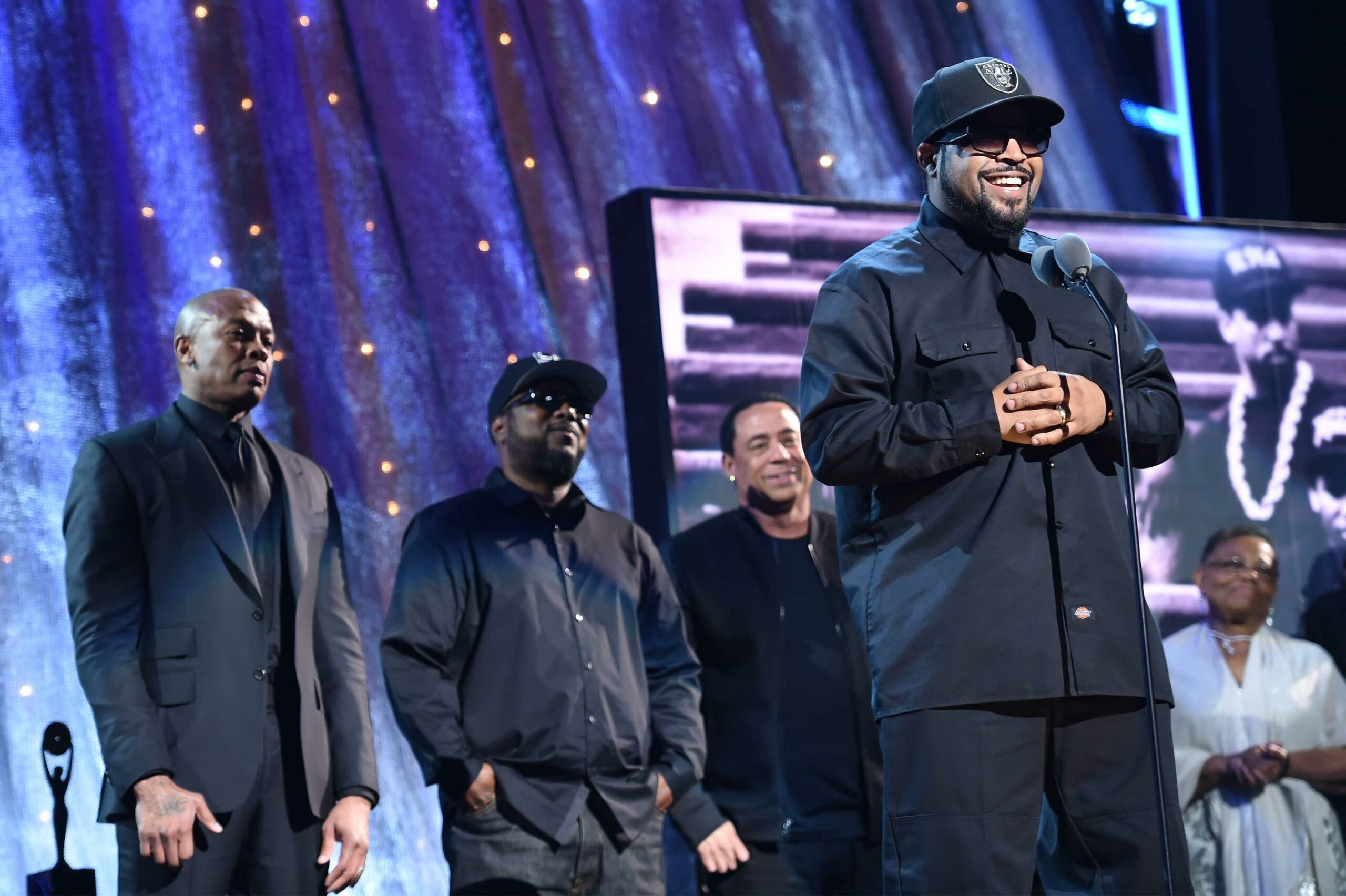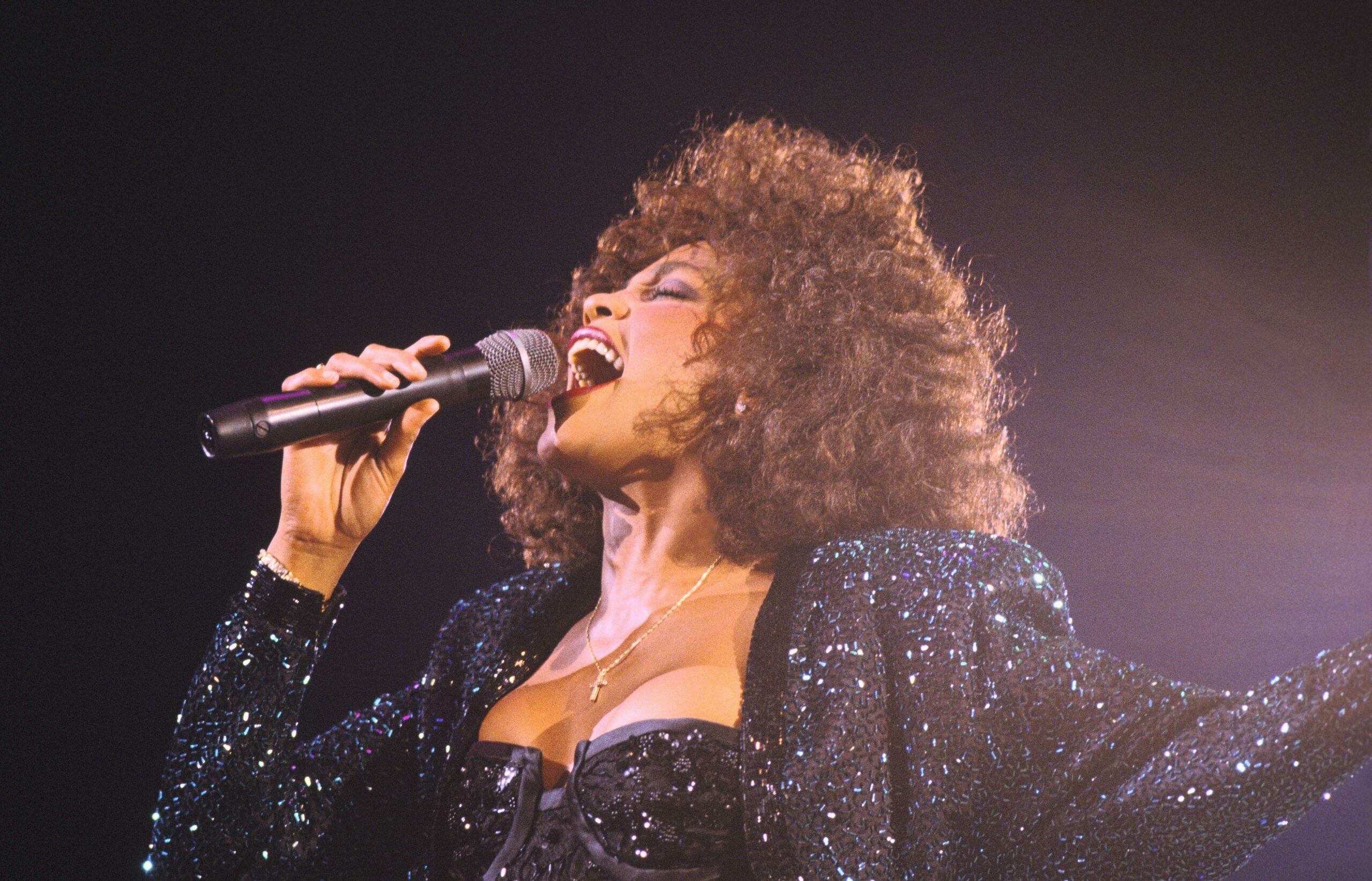Features
It’s (Not) Only Rock ‘n Roll (But I Like It): Biggie And Whitney Continue Rock Hall’s Trend Away From Rock Proper

Dimitrios Kambouris / WireImage / Rock & Roll Hall Of Fame – STRAIGHT OUTTA CLASSIFICATION:
N.W.A.’s Dr. Dre, MC Ren, DJ Yella, Ice Cube and Katie Wright, mother of the late Eazy-E, accept the L.A. rap group’s induction into the Rock & Roll Hall of Fame on April 8, 2016. N.W.A. is one of seven hip-hop artists in the Rock Hall.
The Rock & Roll Hall of Fame has always been about more than rock and roll. The vaunted institution’s inaugural class, inducted in 1986, featured founding rock fathers like Chuck Berry, Buddy Holly and Elvis Presley – but also Godfather of Soul James Brown, Genius of Soul Ray Charles, and King of Soul Sam Cooke.
Rock and roll, after all, has always been more ethos than aesthetic, as Rock Hall chairman John Sykes told Rolling Stone in 2019.
“I’ve always thought that the Rock & Roll Hall of Fame – having been involved in it myself for 25 years now – is no longer about a single genre of music,” Sykes said. “It’s about a spirit that connects with young people.”
Moreover, rock’s history is defined by creative cross-pollination, whether the Grateful Dead were bringing in country and folk, The Clash were dabbling in dub and reggae, or Rick Rubin was bringing righteous riffs to hip-hop in the genre’s infancy.
While the Rock Hall spent the ‘90s inducting the types of bands most associated with the genre – heavyweights like Fleetwood Mac, Led Zeppelin and Pink Floyd – those sorts of inclusions have dwindled in recent years. The explanation’s twofold.
For one, the pool of rock bands that defined the genre while it was still pop’s dominant idiom in the ‘70s and ‘80s continues to narrow. As hugely popular bands such as Aerosmith and U2 have gained admission, so have leading figures from key subgenres, such as punk (Ramones), new wave (Blondie), metal (Metallica), and alternative rock (R.E.M.). The Rock hall has already enshrined dozens of the era’s foremost rock artists.
Rock Hall eligibility rules stipulate that artists may be voted in once their first single turns 25 – which explains why early ‘90s rock touchstones including Nirvana (2014), Green Day (2015), Pearl Jam (2017), Radiohead (2019), and Nine Inch Nails, this year, have all recently been inducted. Plenty of ‘90s rock stalwarts remain, including Rage Against The Machine, Oasis, Beck, Dave Matthews Band, Wilco and Sleater-Kinney, which all became eligible in the past three years.
Simultaneously, the Rock Hall spent much of the ‘10s circling back to commercially huge bands that lacked the critical cachet of the Bowies and Hendrixes of the world. Journey might have sold 48 million records in its career, and Deep Purple might have written the riff every guitarist learns first, but few rock fans would rank them above artists like Van Halen or Black Sabbath. Still, leaner years are ahead for rock, narrowly defined.
Next year, Foo Fighters become eligible, and in 2024, Coldplay will join them; both seem like locks for first-ballot induction. Soon, rock revival legends such as The Strokes, The White Stripes and Yeah Yeah Yeahs will earn eligibility, as will early ‘00s indie darlings such as Arcade Fire and Animal Collective. But those acts arrived during rock’s twilight as America’s dominant genre. Unless the Rock Hall begins inducting that era’s critically maligned bestsellers – think Slipknot, Nickelback, Limp Bizkit – it’ll have to search beyond rock’s boundaries.
That seems to be happening, if slowly. Non-rock acts increasingly line the walls of the Rock Hall, with the institution more frequently acknowledging such artists as rock’s cultural clout has decreased in the 21st century. The trend has coincided with rap’s maturation and relatively recent eligibility for inclusion. The Sugarhill Gang’s 1979 single “Rapper’s Delight” is largely credited with introducing hip-hop to a wider audience in its infancy, and it rose to commercial prominence. It follows, then, that rap artists began to come under consideration in the mid-’00s – after the obligatory 25-year waiting period.

Frederic Reglain/Gamma-Rapho via Getty Images – Whitney Houston
performs at Palais Omnisports de Paris-Bercy in Paris, France, on May 18, 1988, during the “Moment Of Truth World Tour.”
To wit: In 2007, Grandmaster Flash and The Furious Five became the first hip-hop act inducted into the Rock Hall, followed by Run-DMC in 2009, Beastie Boys in 2012, and Public Enemy in 2013. N.W.A. and Tupac Shakur joined the Hall’s ranks in 2016 and 2017, respectively; this year, the Notorious B.I.G. has as well.
These iconic rap artists embodied rock’s anti-establishment ethos as much as – or even more than – many of the Rock Hall inductees that hewed closer to the genre’s traditional aesthetic, from the punk pugnaciousness of the Beastie Boys to the searing politics of Public Enemy to the iconoclastic swagger of Tupac. And, in some cases, they didn’t even eschew rock to begin with, like on Run-DMC’s remake of Aerosmith’s “Walk This Way,” a surprise smash in 1986 that demonstrated the inextricable bond between the genres and resurrected the classic rock band’s return to boot.
Rap’s presence at the Rock Hall will only grow going forward. Several venerated artists who started out in the ‘80s, such as LL Cool J – nominated unsuccessfully five times – and A Tribe Called Quest, remain absent, as do recently eligible acts including Nas, Wu-Tang Clan, OutKast, Snoop Dogg, and The Roots. The Rock Hall could well begin to go back and fill in hip-hop’s blanks, as it has continued to do with rock.
But the real attention will be on those gaining eligibility. Jay-Z, another rapper with ties to Rubin, becomes eligible in 2021, and other hip-hop artists on deck include Eminem (2022), Missy Elliott (2023), Puff Daddy (2023), J Dilla (2023), and Lauryn Hill (2024).
To be sure, there’s another route for the Rock Hall: It could fill in other rock gaps it, in the same way it has recently turned to the sales mammoths of rock’s heyday well after they first earned eligibility. At Pearl Jam’s 2017 induction, bassist Jeff Ament wore a shirt with a slew of nearly 100 seminal artists outside of rock’s mainstream, ranging from indie (Sonic Youth, Dinosaur Jr., The Replacements, Pixies) to punk (Minutemen, X, Fugazi) to metal (Slayer, Iron Maiden, Judas Priest). Seven – The Cars, Nina Simone, Roxy Music, The Cure, Bon Jovi, Nine Inch Nails and T. Rex – have been admitted since. Most haven’t. (Ament’s shirt incorrectly said Waits, inducted in 2011, hadn’t yet made it to the Hall.)
Other genres provide wild cards, particularly electronic. While the Hall has inducted artists with well-noted ties to genre, including Depeche Mode and Nine Inch Nails this year, and Radiohead and The Cure last year, it’s stopped short of a more full-throated embrace. Venerated German electronic pioneers Kraftwerk have been nominated unsuccessfully six times – second in unsuccessful nominations only to Chic (11) – and other than Afrika Bambaataa, nominated unsuccessfully once in 2008, other electronic artists haven’t gotten that far. Brian Eno, notably, has been inducted with Roxy Music, but not as a solo act; rock artists, including all four Beatles and all the members of Crosby, Stills, Nash & Young, have been inducted as individuals in addition to with their groups.
That, however, could also be poised to change. Much like hip-hop in the late ‘00s, a slew of commercially and critically successful artists from the genre are now becoming eligible, hailing from an era when the genre deepened its cultural cachet. In the last four years, Daft Punk, Moby and Aphex Twin have hit a quarter-century of existence, and artists including The Chemical Brothers (2021), Basement Jaxx (2022) and Fatboy Slim (2022) will shortly reach the mark. Given its continued impact on rock, rap and other genres, and the genre’s reputation for spectacle – Daft Punk’s “Alive Tour” in 2006 and 2007 put a rave-y spin on high-production arena-rock gigs – and electronic seems like a natural heir of the many of the qualities that once precluded Rock Hall induction. Plus, few musicians carried the torch of rock debauchery more than DJs during the EDM boom of the early ‘10s.
But, for now, it’s all speculation. The Rock Hall’s 2020 slate largely epitomizes its recent induction trends: an influential ‘70s glam-rocker (T. Rex), a popular classic rock staple (The Doobie Brothers), an alt nation behemoth with critical and commercial cred (Nine Inch Nails), a revered rap artist (The Notorious B.I.G.) and an uncontested pop titan (Whitney Houston). Next year’s batch of inductees could go in several directions – although it’s safe to say Dave Grohl and Shawn Carter can start preparing their speeches.